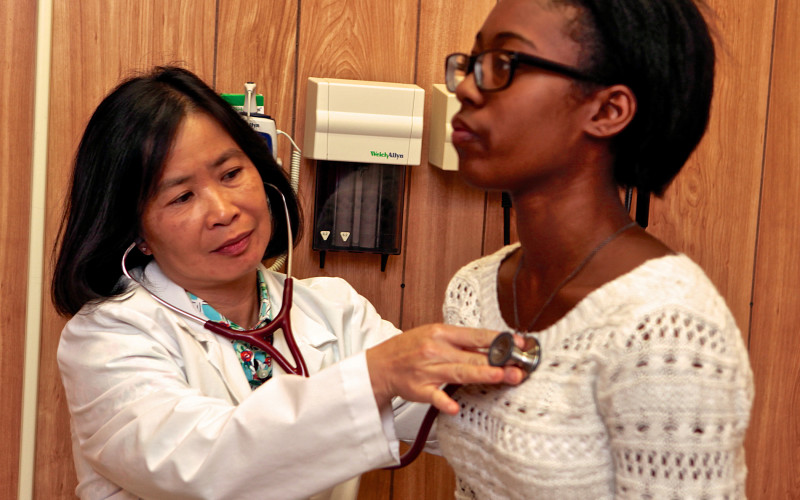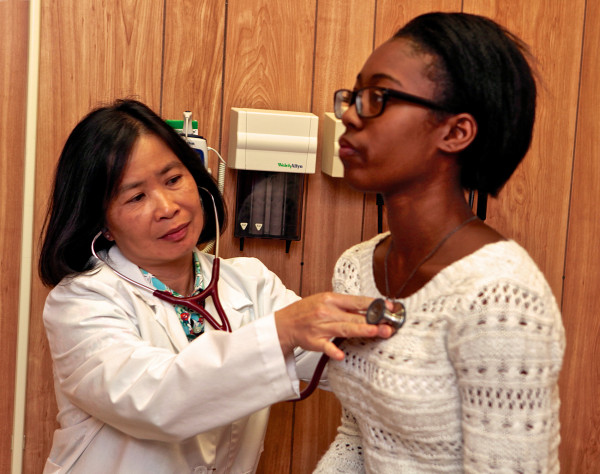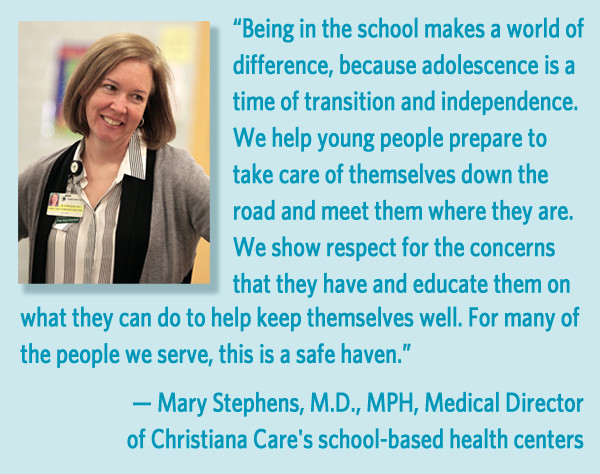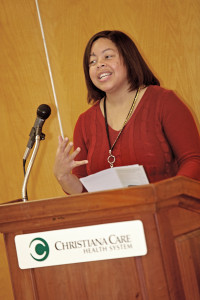Christiana Care delivers community health services with class


The math behind Christiana Care’s school-based health centers adds up. For decades, Christiana Care staff members working in public high schools in Delaware have been providing the highest quality health care to one of the most important and vulnerable segments of the community — adolescents.
There were 21,000 visits by students to Christiana Care’s 15 school-based health centers in the 2013-2014 school year.
In the 2013-2014 school year, adolescents visited those 15 centers more than 21,000 times. Each of those visits was a chance for the physicians, nurse practitioners, social workers and registered dietitians supporting the centers to provide care to uninsured members of the population or those who might be uncomfortable seeking care at a physician’s office or other facility. In the familiar settings of the students’ schools, the centers provide services that include physical exams, health screenings, women’s health care, nutrition and weight management, drug and alcohol abuse counseling, and individual, family and group counseling.
Following a traumatic family event in her sophomore year, senior Alexus Bush-Leon sought that counseling from the Christiana Care staff of the schoolbased health center at William Penn High School, which recently celebrated its center’s 20th anniversary. “It helped me to have a place to go,” she told attendees of the anniversary celebration. “It made a huge difference having it right here in the school. I felt trapped. I even thought about dropping out at one point. I couldn’t handle the stress of school and the stress of home, but I went to talk to them and got the chance to continue my education and get my mental health in check.”
It’s also a source for instant access to the care that keeps students in school on a day-to-day basis. A partnership with the Delaware Division of Public Health, Department of Health and Social Services, the school-based health centers program also provides students with treatment for minor illnesses and injuries, ensuring they are both seen for those issues and able to return to the classroom as quickly as possible.Mary Stephens, M.D., MPH, medical director of Christiana Care’s school-based health centers, said Alexus’s experience is indicative of the positive effects schoolbased health centers have had over the last three decades. “Being in the school makes a world of difference, because adolescence is a time of transition and independence,” she said. “We help young people prepare to take care of themselves down the road and meet them where they are. We show respect for the concerns that they have and educate them on what they can do to help keep themselves well. For many of the people we serve, this is a safe haven.”

It’s a connection that extends to the rest of the medical community as well, said Michael P. Rosenthal, M.D., chairman of the Department of Family and Community Medicine at Christiana Care.“There is a tremendous amount of national data indicating the very positive effects school-based health centers have on graduation rates,” said Kathy Cannatelli, director for Community Health and Preventive Medicine, who is also Delaware state leader of the national School-Based Health Alliance and vice president of the Delaware School-Based Health Alliance. “This program, in short, keeps kids in school, and it does it by offering them the full gamut of services from knowledgeable staff members who are connected to their community.”
Dr. Rosenthal said school-based health center personnel emphasize the importance of follow-ups with primary care and family physicians and stress to students the confidentiality of any visit to a medical facility, hoping to alleviate discomfort with discussing sensitive topics that can sometimes prevent students from seeking help. He also noted that, in addition to handling follow-ups requested by primary care physicians, school-based health center staff members strongly encourage students they treat to follow up with their doctors after a visit to the professionals in their schools.“One of our goals in the centers is to educate students on the importance of maintaining their health,” he said. “This is the time when adolescents develop habits they’ll have for life, and we want them to include addressing their health needs and consulting and trusting their doctors.”
“We have incredible resources at Christiana Care and great relationships with our colleagues, the primary care physicians,” added Omar Khan, M.D., MHS, associate vice chair for Community Health and Preventive Medicine. “But most importantly, we work together to give each student what he or she wants and needs — attention and care focused on him or her. At the moment they come to see us, they want to feel like they are the most important patient, the most important person, we are seeing. They are trusting us to help them with everything from social acceptance to grades to their health and relationships with adults and peers.”

A direct extension of Christiana Care’s mission to improve the health of the people in the community, the school-based health center program supports and staffs 15 of the 29 school-based health centers in Delaware. State Representative Valerie Longhurst called the centers “a great safety net for children” and praised them for directly supporting young people of the state as they face a wide range of challenges that can affect the pursuit of an education.
“We don’t want to lose kids facing these struggles,” she said. “They are very impressionable in high school. Life happens, and Christiana Care and the other providers behind these centers have been there to catch them for us. It’s been a great partnership.”